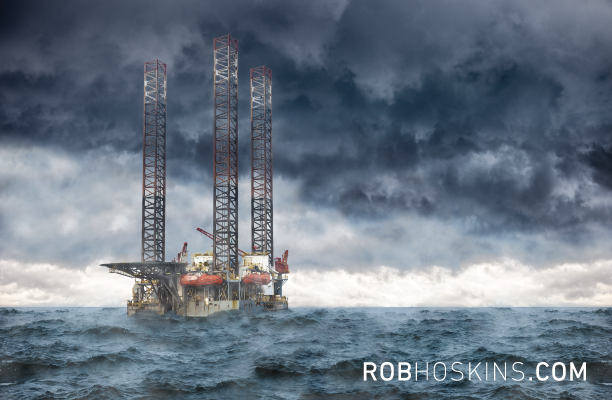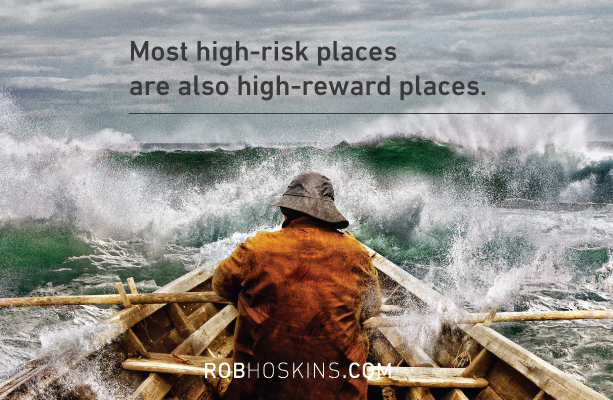In 1979, a potentially huge oil field was discovered on the Grand Banks. It had the potential to restore economic hope to the fast-dwindling provinces of Newfoundland and Labrador. The location of the oil field, however, was treacherous–requiring oil rigs to be able to handle such threats as icebergs and severe storms. The Ocean Ranger mobile offshore drilling unit was hired to explore this opportunity.
On the morning of Valentine’s Day 1982, the Ocean Ranger received a report of a strong winter storm forecast to hit later that day and last into the evening. They continued to drill. Around 7pm, other vessels in the vicinity reported being hit by an unusually large wave, which hit the Ocean Ranger around 9pm. By 1am the Ocean Ranger was in a distressed situation. It capsized and sank just a few hours later. All 84 crew members lost their lives.

I’m convinced that in life, like in the ocean, the deeper the water, the more precious the natural resource waiting to be exploited. To get to it requires greater risk. The price of admission: an increased probability of encountering disaster.
[Tweet “The deeper the water, the more precious the natural resource waiting to be exploited Some of us have been called to pioneer dangerous places.”]
As much as you plan, there will always be unpredictable events that rock your world.
I was talking to my friend Dick Yue at MIT. He is the leading expert on Rogue Waves–which is what experts conjecture was the “unusually large wave” that hit the Ocean Ranger. Dick gave me insight not only into the physical ramifications of the phenomenon, but I believe deep spiritual insights as well.
Rogue Waves can build to a height of a 10-story building and advance on you at the speed of a train. They can happen almost anywhere on the ocean– where people are fishing, boating, etc. The most devastating ones seem to take place in more remote, offshore locations where exploration for oil and gas is taking place–like in the North Sea.
We are just beginning to understand the conditions that contribute to the formation of a Rogue Wave, such as nonlinear interactions among the wave components. In layman’s terms, when there is already agitation in the water below and you add a storm in the atmosphere above, they roil up. This increases the probability of a Rogue Wave forming and dispatching destruction on anyone and anything in its path.
Strictly speaking, Rogue Waves are defined by wave heights multiple times that of the average in a given wavefield. Anyone being “hit” by something outside of their norm has experienced a “Rogue Wave” in life. While the severity will differ based on your version of normal, the reality is that everyone will experience these anomalies in their lives–some are easily navigable and others completely obliterative.
Sailors describe Rogue Waves as “walls of water” or a “hole in the ocean”. As wave height becomes greater, it also becomes steeper. In some cases, they become so steep that they actually break–imagine a 10-story wall of water breaking over you!
Calling a Rogue Wave a “freak” of nature, is actually a misnomer since, surprisingly, they satisfy the laws of physics. As we continue to study and increase our understanding of Rogue Waves, they are becoming more predictable. However, this does not take away from the awe-inspiring extreme event that rises out of the “ordinary”.
When comparing Rogue Waves to life, many of us think of the Ocean Ranger and wonder if this tragedy could have been avoided.
While there have been great advances in our study and understanding of what causes Rogue Waves, we know with certainty that severe seas are marked contributors. It is extremely rare for a Rogue Wave to occur in a “small” or normal sea state.
If storms can be avoided, then your chances of encountering a Rogue Wave will be significantly less. If you are in a fixed location or your call requires that you be somewhere regardless of conditions (think Coast Guard or Navy Rescue Patrol), then you are at their mercy.
Since Rogue Waves are hard to predict and strike with little warning, preparing for one is like preparing for a tornado or an earthquake. Obviously, the best chance of avoiding disaster is to stay away from high-risk places.

Whether it’s the ocean where unlocked treasures of oil and gas reside beneath the surface, or areas of the world unreached by the Gospel with a harvest of souls ripe to hear the Good News, some of us have been called to pioneer these dangerous places.
To complete our mission requires that we live diligently. The more dangerous the undertaking, the more disciplined preparation is required. Failing to study the conditions you are stepping into can–like in the case of Rogue Waves– end in death and destruction. God has given us the tools to study and prepare to step into dangerous places with strategy and intention so that we have a greater chance of successfully completing the mission.




1 Comment
the website is very supportive, thank you